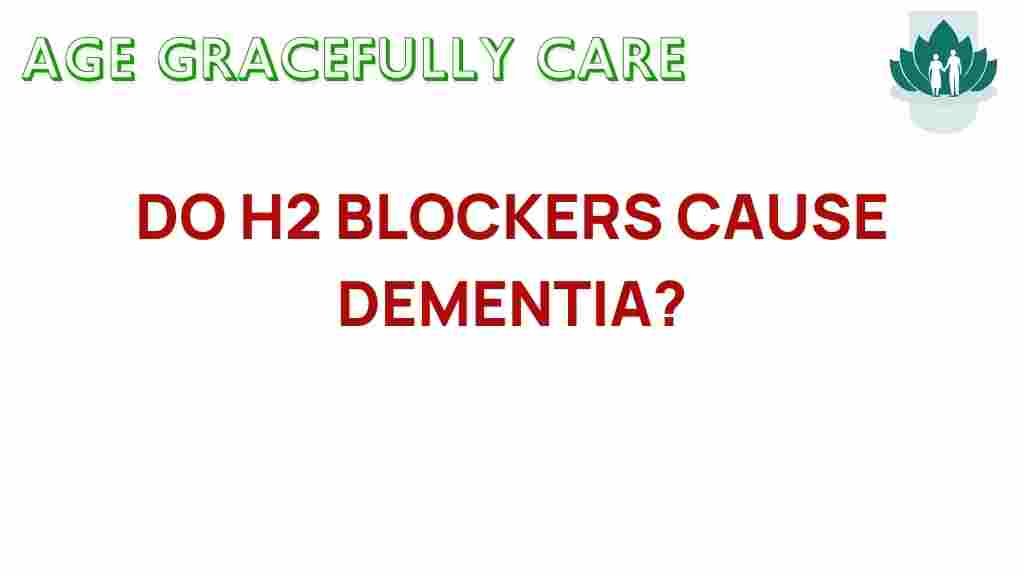Unraveling the Mystery: Do H2 Blockers Cause Dementia?
In recent years, the rising concern over the potential health risks associated with various medications has led many individuals to question the safety of their prescriptions. Among these medications, H2 blockers, commonly used to treat gastrointestinal issues, have garnered attention for their possible link to cognitive decline and dementia. This article aims to explore the relationship between H2 blockers and dementia, examining research findings, medication side effects, and implications for patient safety.
What Are H2 Blockers?
H2 blockers, or histamine-2 receptor antagonists, are a class of medications that reduce stomach acid production. They are primarily used to treat conditions such as:
- Gastroesophageal reflux disease (GERD)
- Peptic ulcers
- Zollinger-Ellison syndrome
Common H2 blockers include:
- Ranitidine (Zantac)
- Famotidine (Pepcid)
- Cimetidine (Tagamet)
These medications work by blocking the action of histamine on H2 receptors in the stomach lining, thereby lowering acid secretion and providing relief from gastrointestinal discomfort.
The Connection Between H2 Blockers and Dementia
With the increasing use of H2 blockers, researchers have begun to investigate potential long-term effects on cognitive health. Some studies have suggested a correlation between the use of these medications and an increased risk of dementia.
Key Research Findings
Several research studies have explored the relationship between H2 blockers and cognitive decline:
- A 2016 study published in the journal “Alzheimer’s & Dementia” indicated that older adults who used proton pump inhibitors (PPIs), which are similar to H2 blockers, had a higher risk of dementia.
- A 2019 study found that long-term use of H2 blockers was associated with an increased risk of dementia in older adults.
- Another research initiative focused on the effects of cimetidine and ranitidine, revealing that they might contribute to cognitive impairment in some patients.
These findings have raised questions about the safety of H2 blockers, especially concerning their effects on cognitive health.
Understanding Medication Side Effects
Like all medications, H2 blockers come with potential side effects. While many individuals tolerate these drugs without issues, some may experience:
- Headaches
- Dizziness
- Diarrhea or constipation
- Fatigue
There is also concern about how long-term use might interact with other medications, potentially increasing the risk of cognitive decline.
Health Risks Associated with H2 Blockers
When considering H2 blockers, it is essential to be aware of the broader health risks associated with their use:
- Long-term use can lead to nutrient deficiencies, such as vitamin B12, which is crucial for neurological health.
- H2 blockers may alter the gut microbiome, which plays a vital role in overall health and cognitive function.
- Drug interactions with other medications can exacerbate side effects or lead to new health risks.
These factors contribute to the overall consideration of patient safety when prescribing H2 blockers.
Cognitive Decline and Aging
As individuals age, the risk of cognitive decline increases. Factors contributing to this decline include:
- Genetic predispositions
- Lifestyle choices (diet, exercise, etc.)
- Chronic health conditions
- Medication side effects
Understanding the potential impact of H2 blockers on cognitive function is crucial for older adults who may already be at risk for dementia.
Drug Interactions and H2 Blockers
Before starting any new medication, it is vital to discuss potential drug interactions with your healthcare provider. H2 blockers can interact with various medications, leading to altered effectiveness or increased side effects. Common drug interactions include:
- Anticoagulants (blood thinners)
- Antidepressants
- Anticonvulsants
Being aware of these interactions can help mitigate health risks and improve patient safety.
Step-by-Step Process for Safe Use of H2 Blockers
If you or a loved one is considering H2 blockers, follow these steps to ensure safe use:
- Consult Your Healthcare Provider: Discuss your medical history, current medications, and any concerns about cognitive health.
- Monitor for Side Effects: Keep track of any side effects experienced while taking H2 blockers and report them to your doctor.
- Regular Health Check-ups: Schedule regular appointments to assess gastrointestinal health and cognitive function.
- Evaluate Necessity: Periodically review the need for ongoing H2 blocker therapy with your healthcare provider.
Troubleshooting Tips
If you experience side effects or have concerns about taking H2 blockers, consider these troubleshooting tips:
- Keep a detailed record of symptoms and side effects to discuss with your healthcare provider.
- Ask about alternative treatments for gastrointestinal issues if side effects become problematic.
- Stay informed about new research findings related to H2 blockers and cognitive health.
Being proactive about your health can help mitigate potential risks.
Conclusion
The potential link between H2 blockers and dementia is an important topic for those concerned about their cognitive health. While research findings indicate there may be risks associated with long-term use of H2 blockers, it is essential to consider individual health circumstances.
Always consult with your healthcare provider before making any changes to your medication regimen. Being informed about medication side effects, health risks, and drug interactions can help improve patient safety and overall health outcomes.
For more information on gastrointestinal health and medication safety, visit this resource. Additionally, keep up with the latest research findings on cognitive health and medications by exploring this article.
This article is in the category Health and created by AgeGracefullyCare Team
